Introduction
How Long Does Rabbit Sleep: Rabbits, as crepuscular animals, are most active during the early morning and late afternoon, which makes their sleep patterns distinct from those of diurnal (active during the day) and nocturnal (active during the night) creatures. Understanding how long rabbits sleep requires a closer look at their natural behavior and physiological adaptations.
On average, rabbits sleep for about 8 hours a day, but this can vary depending on various factors such as age, environment, and overall health. Younger rabbits tend to sleep more, often surpassing the 8-hour mark, while older rabbits might sleep slightly less. Domesticated rabbits, such as those kept as pets, can have slightly altered sleep patterns due to their living conditions and interactions with humans.
Rabbits are known for their light sleep and acute senses. They have a unique ability to sleep with their eyes open, which helps them stay alert to potential dangers even while resting. This behavior is a survival mechanism inherited from their wild ancestors, where staying vigilant was essential to avoid predators.
Burrowing animals by nature, rabbits are highly attuned to their surroundings. They often nap in shorter intervals throughout the day, remaining semi-alert and ready to react at the slightest sign of danger. This fragmented sleep pattern ensures they can quickly respond to threats and make rapid escapes if necessary.
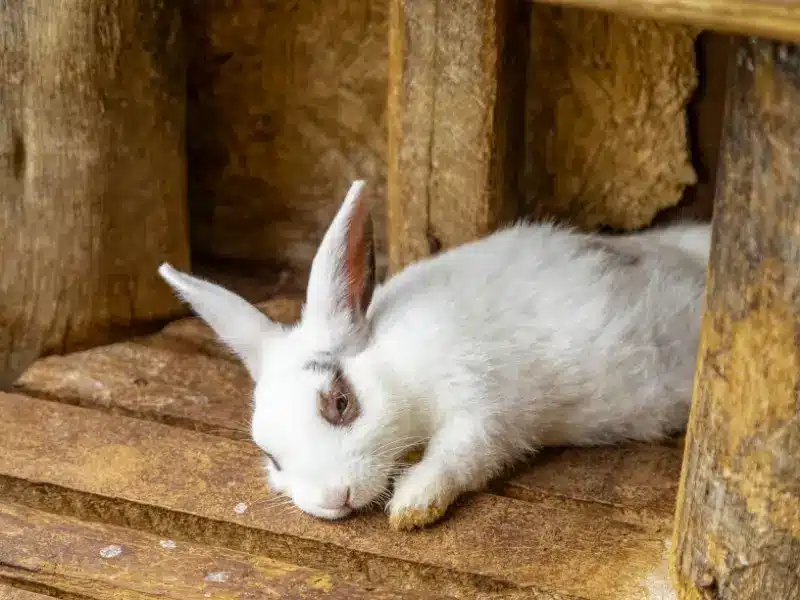
How long do rabbits sleep at a time?
Studies have found that rabbits will get around eight and a half hours of sleep in a day on average. However, a rabbit that feels very safe and comfortable in their home environment will often get even more sleep (closer to 12 hours a day). Our rabbits don’t get 8-12 hours of sleep all at once.
The Duration of Rabbit Sleep
Rabbits are crepuscular animals, which means they are most active during dawn and dusk. This unique activity pattern is closely linked to their sleep cycle. On average, rabbits sleep anywhere from 8 to 10 hours a day. This is distributed across several shorter naps rather than one continuous sleep session. Rabbits’ sleep cycles are divided into segments, which allows them to remain vigilant for potential predators while still obtaining the necessary rest.
Polyphasic Sleep Patterns
Unlike humans who generally engage in monophasic sleep (single, prolonged sleep episode), rabbits exhibit polyphasic sleep patterns. Polyphasic sleep involves multiple shorter sleep episodes throughout the day and night. Rabbits take advantage of their crepuscular nature to nap intermittently, enabling them to conserve energy and maintain their vigilant survival instincts.
Factors Influencing Rabbit Sleep
Natural Behavior: Rabbits’ wild ancestors had to adapt to various predators in their environment. By sleeping in shorter cycles, rabbits can be alert to danger at any time.
Diet: Rabbits are herbivores, and their diet of fibrous vegetation requires efficient digestion. Sleeping in short bursts helps maintain a steady digestion process.
Social Interaction: In the wild, rabbits live in colonies. Their short sleep cycles enable them to interact with other members of their group and engage in activities together.
Environmental Factors: Light plays a significant role in regulating rabbits’ sleep-wake cycles. Artificial light can impact their sleep patterns, so it’s essential to create a natural day-night cycle for pet rabbits.
Safety: Rabbits tend to feel most secure when they’re hidden from view. Their sleep patterns allow them to rest while remaining partially concealed in their burrows or hiding spots.
Do rabbits sleep at night?
Nope! Another question that people often ask is whether rabbits sleep mostly during the day or at night. And the answer is neither. They are crepuscular, meaning that they are most active at dusk and dawn.
Nocturnal or Crepuscular?
Contrary to popular belief, rabbits are not nocturnal animals, which means they aren’t primarily active during the night. Instead, rabbits are classified as crepuscular creatures, which means they are most active during the twilight hours of dawn and dusk. This unique activity pattern is attributed to their evolutionary history and survival strategies.
The Crepuscular Advantage
Predation Avoidance: In the wild, rabbits have adapted to a range of predators. Being active during the low-light periods of dawn and dusk provides them with some level of protection as they can more easily spot potential threats.
Resource Access: Crepuscular activity allows rabbits to access food resources when the competition from diurnal and nocturnal species is minimized. This increases their chances of finding sufficient food to sustain themselves.
Temperature Regulation: The temperatures during dawn and dusk are generally milder compared to the extremes of daytime heat and nighttime cold. This makes it more comfortable for rabbits to be active during these times.
Sleeping Habits of Crepuscular Rabbits
While rabbits are not primarily active at night, they do engage in sleep during the nighttime hours. However, their sleep patterns differ from those of humans and other animals. Instead of one continuous sleep session, rabbits practice polyphasic sleep, which involves multiple short naps throughout the day and night. These naps ensure that rabbits remain alert and vigilant even while resting.
Factors Influencing Rabbit Sleep
Light: Light is a crucial factor that influences rabbit sleep patterns. In the absence of artificial light, rabbits may adjust their sleep-wake cycles to align with natural lighting conditions.
Diet and Digestion: Rabbits’ diets consist of fibrous vegetation that requires efficient digestion. Their polyphasic sleep patterns enable them to graze and digest food throughout the day and night.
Social Behavior: For rabbits living in colonies, crepuscular activity and sleep patterns allow them to interact with their group members during optimal times.
Do rabbits sleep quickly?
Whilst humans (if we are lucky) will sleep through the night, rabbits wake up periodically at night, and sleep for quite lengthy periods during the day. They are prey animals, and need to be constantly alert for danger, so in general they sleep much lighter and for shorter periods than we do.
The Art of Quick Naps
Rabbits are known for their ability to enter a state of restfulness rapidly, often referred to as “quick naps.” These naps are characterized by their brevity, with rabbits appearing to doze off and awaken within a matter of moments. This behavior is linked to their natural instincts and is a product of their evolutionary history.
Vigilance and Survival
The quick napping behavior of rabbits is closely tied to their need for vigilance and survival in the wild. As prey animals, rabbits are constantly on guard for potential predators. Their rapid napping style allows them to momentarily rest without fully entering deep sleep. This enables them to maintain heightened awareness of their surroundings and react quickly to any signs of danger.
Polyphasic Sleep: An Adaptive Strategy
Rabbits’ quick napping tendencies are a part of their polyphasic sleep pattern, where they engage in multiple short sleep episodes throughout the day and night. This sleep strategy has evolved as a means to balance rest and vigilance. Instead of a single prolonged sleep session, rabbits take quick naps to avoid becoming vulnerable to predators.
Factors Influencing Quick Naps
Predator Avoidance: In the wild, rabbits are at constant risk of being preyed upon by various animals. Quick napping helps them remain vigilant and ready to escape at a moment’s notice.
Energy Conservation: Quick naps allow rabbits to conserve energy while still maintaining a level of alertness. This is especially important given their herbivorous diet, which requires efficient digestion and energy utilization.
Natural Environment: In the wild, rabbits often seek refuge in burrows or other hidden spots. Their quick napping behavior enables them to stay partially concealed while still being able to rest.
What do rabbits do at night?
Sleeping through the night
Most rabbits will go to sleep between 10-12 pm. They’ll sleep until it’s time to wake up in the morning and start a new day. Like afternoon nap time, many rabbits will periodically get up to stretch and eat in the middle of the night.
Exploring Rabbit Nocturnal Activities
Foraging: Rabbits are herbivores with a diet consisting mainly of grasses, leaves, and other vegetation. At night, they often venture out to forage for food. The cover of darkness provides some protection from predators, and they can graze without the competition they might face during daylight hours.
Social Interaction: Some rabbit species, especially those that live in groups, continue to engage in social interactions during the night. These interactions might involve grooming each other, communicating through body language, or simply being in proximity to one another for safety and companionship.
Movement and Exploration: Rabbits are known for their agility and speed. During the night, they may explore their surroundings, hop around, and even engage in playful activities. Their movements help them learn about their environment and identify potential hiding spots.
Reproductive Activities: Breeding behavior can also occur at night. Rabbits might engage in courtship rituals and mating during the cover of darkness to reduce their visibility to predators.
Resting and Vigilance: While rabbits are not nocturnal animals, they do engage in periods of rest and quick naps throughout the night. These brief moments of slumber allow them to conserve energy and remain vigilant against predators.
Nesting and Shelter: Wild rabbits often have burrows or hiding spots where they rest and seek shelter during the night. These safe havens protect them from predators and harsh weather conditions.
Adaptation to Human Activities: In urban and suburban environments, rabbits might adjust their activities at night to avoid interactions with humans and other potential disturbances.
Significance of Nocturnal Behaviors
Rabbits’ nighttime activities are closely tied to their survival instincts and natural behaviors. The cover of darkness provides them with a degree of protection against predators, allowing them to carry out essential activities without as much risk. Their agility and ability to navigate in low light contribute to their overall survival.
Do rabbits sleep in dark or light?
Rabbits need a contrast of light and darkness. A rabbit that lives in constant light can experience stress. In addition, their eyes can be damaged, and they’ll gain weight. Provide a dark area for your bunny to sleep and relax within.
Natural Nocturnal Instincts
Rabbits are crepuscular animals, which means they are most active during the dawn and dusk hours. This activity pattern is a result of their evolutionary history and adaptation to a world where predators are more active during the day. As such, rabbits are naturally predisposed to sleeping in darker environments. Darkness provides them with a sense of safety and allows them to rest without the constant threat of predators.
Dark Environments: A Sense of Security
Rabbits are more likely to choose darker environments for sleep due to several reasons:
Predator Avoidance: In the wild, rabbits are prey animals, constantly at risk from various predators. Darkness provides them with a level of camouflage and protection against these threats.
Natural Circadian Rhythms: Rabbits’ circadian rhythms are attuned to their crepuscular activity patterns. Sleeping in a dark environment aligns with their natural sleep-wake cycle.
Comfort and Relaxation: Darkness promotes a sense of comfort and relaxation for rabbits, allowing them to enter a restful state more easily.
Influence of Light in Captivity
While wild rabbits naturally prefer darker sleeping environments, the situation might differ for domesticated rabbits kept as pets. In captivity, rabbits can be influenced by artificial lighting conditions and the daily routine of their owners. Some considerations include:
Artificial Lighting: Bright artificial lighting at nighttime can disrupt rabbits’ natural sleep patterns. It’s important to provide them with a dimly lit or dark sleeping area to mimic their natural environment.
Day-Night Cycle: Maintaining a consistent day-night cycle is essential for a pet rabbit’s well-being. This means providing them with periods of darkness for sleep and periods of light for activity.
Sleep Disturbances: Loud noises, sudden movements, or disturbances during the night can affect rabbits’ sleep. Ensuring a quiet and calm environment during their sleeping hours is crucial.
Do rabbits get lonely at night?
If you only have one rabbit, you can give it some companionship, but it will still be lonely at night or when you are away at work. Sometimes a female rabbit will be fine on its own. If you do not notice hyperactivity or withdraw with a female rabbit, it is possible that she might be content by herself.
Social Nature of Rabbits
In the wild, rabbits live in colonies or groups, where social interactions play a crucial role in their survival and well-being. They groom each other, communicate through body language, and seek comfort from one another. This strong social bond is carried over to domesticated rabbits, making companionship an essential aspect of their lives.
Loneliness in Rabbits
Loneliness is not exclusive to humans; many animals, including rabbits, can experience feelings of isolation and distress when separated from their companions. While rabbits may not exhibit loneliness in the same way humans do, they can still feel the effects of isolation. Symptoms of loneliness in rabbits might include:
Lethargy: Lonely rabbits might become less active and less engaged in their environment.
Behavioral Changes: Changes in eating habits, grooming behaviors, or vocalizations could indicate a rabbit’s discomfort due to loneliness.
Stress and Agitation: Rabbits separated from their bonded partners may become stressed, leading to anxious behaviors.
Loneliness at Night
Rabbits are crepuscular, meaning they are most active during dawn and dusk. While they do sleep during the night, they might still be affected by loneliness, especially if they are used to having companions around during their active hours. Factors contributing to loneliness at night might include:
Social Dependency: Rabbits that are used to the presence of bonded companions during their active times might miss that companionship when alone at night.
Security: Rabbits feel safer when surrounded by their companions. Being alone in the dark might lead to feelings of vulnerability.
Do rabbits watch you sleep?
Your rabbit is keeping watch for you
They’ll loaf, or lay down near you, but stay more or less aware while you sleep. They’ll often be facing you as they watch over you, but usually, they’re actually keeping an eye and an ear out for potential threats.
Rabbits’ Observant Nature
Rabbits are known for their curious and observant nature. They possess keen senses that allow them to be aware of their surroundings, including the presence of humans. While rabbits may not comprehend the concept of sleep in the same way humans do, they can exhibit certain behaviors that suggest they are attuned to changes in their environment.
Awareness of Human Presence
Rabbits can become accustomed to their human caregivers’ routines and behaviors. They might notice when their owners are resting or sleeping and respond to these changes. However, it’s essential to recognize that rabbits don’t possess the same level of consciousness or cognitive awareness as humans, so their observations are likely based on sensory cues rather than a deep understanding of the concept of sleep.
Possible Behaviors
Quiet Observation: Rabbits might become still and quiet when they notice their human companions resting. This behavior could be attributed to their natural curiosity and sensitivity to changes in the environment.
Proximity: Some rabbits may approach their owners and remain nearby during moments of rest. This behavior could stem from their desire for companionship and the comfort of being close to familiar individuals.
Response to Movements: If rabbits notice their owners stirring or waking up, they might react by becoming more active themselves, possibly seeking attention or anticipating interaction.
Routine Association: If rabbits are accustomed to certain activities or routines before their owners sleep, they might become alert or anticipate those activities as a signal that something is about to happen.
Interpreting Rabbit Behavior
It’s important to interpret rabbit behavior within the context of their species and their unique traits. While rabbits may exhibit behaviors that suggest they are aware of their human companions’ activities, their motivations and understanding are different from those of humans. Rabbits don’t possess the same complex thought processes, emotions, or intentions as humans do.
Building a Bond
The interactions between humans and rabbits can lead to strong bonds built on trust and companionship. If you observe your rabbit displaying behaviors that suggest they are observing you during sleep or other activities, it’s a testament to the bond you share. Providing a comfortable and secure environment, along with regular social interaction, can strengthen this bond and contribute to the well-being of your rabbit.
Do rabbits close their eyes to sleep?
Rabbits sleep with their eyes open
They can sleep with their eyes closed too, but usually rabbits will only close their eyes when they are sleeping if they feel very safe. So you might think your rabbit never sleeps because they never close their eyes, but in reality they’re sneaking a nap right in front of you.
Rabbit Sleep Characteristics
Rabbits are known for their unique sleep patterns, which include multiple short naps throughout the day and night. These naps are often referred to as “catnaps” and serve several purposes, including conserving energy, digesting food, and remaining alert to potential predators. Given their crepuscular nature, rabbits engage in restful periods when they feel safe and comfortable.
Do Rabbits Close Their Eyes to Sleep?
Yes, rabbits do close their eyes when they sleep. While it might appear that rabbits are constantly alert due to their vigilant behavior, they do close their eyes during their short naps. Closing their eyes serves as a sign of relaxation and restfulness. Just like many other animals, rabbits require moments of complete relaxation to allow their bodies to recover and rejuvenate.
Factors Influencing Eye Closure
Safety and Security: When rabbits are in a safe and comfortable environment, they feel more at ease closing their eyes during rest. This behavior indicates that they trust their surroundings and are not under immediate threat.
Physical Relaxation: Closing their eyes is a natural response to relaxation. When rabbits find a cozy and secure spot, they are more likely to close their eyes as they enter a deeper state of rest.
Energy Conservation: Closing their eyes might also be a way for rabbits to conserve energy while resting. It helps them minimize external stimuli and focus on internal bodily processes.
Bonded Companionship: Rabbits that are part of a bonded pair or a group might feel more comfortable closing their eyes when they have trusted companions nearby to watch out for potential threats.
Day-Night Cycle: Rabbits’ circadian rhythms are influenced by the natural day-night cycle. Closing their eyes during sleep aligns with their crepuscular activity patterns.
Understanding Rabbit Behavior
Rabbits’ tendency to close their eyes during sleep highlights their need for relaxation and recovery. While their survival instincts keep them vigilant and aware, they still require moments of respite to maintain their overall health and well-being. Understanding and respecting these natural behaviors can help pet owners create a suitable and comfortable environment for their rabbit companions.
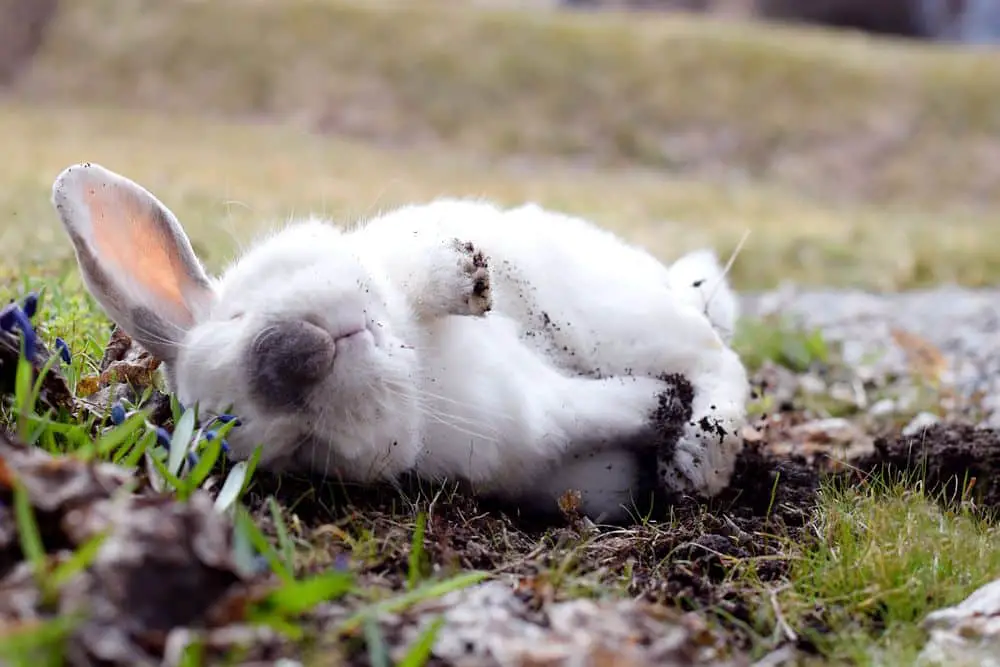
Conclusion
One of the key factors influencing rabbit sleep is their age. Young rabbits, commonly referred to as kits, sleep significantly more than their adult counterparts. This extended sleep duration in young rabbits is essential for their rapid growth and development. As they mature, their sleep patterns gradually shift to align more closely with those of adult rabbits.
The environment in which rabbits live also plays a crucial role in their sleep patterns. Domesticated rabbits, living in the safety of human homes, may have more consistent sleep routines compared to their wild counterparts. Wild rabbits, on the other hand, need to be constantly aware of potential threats from predators. This heightened need for vigilance might lead them to sleep less and take shorter, more frequent naps.
Rabbit sleep is characterized by its fragmentation. Rather than having long, continuous sleep cycles like humans, rabbits often experience shorter sleep bouts throughout the day and night. This segmented sleep allows them to maintain their awareness of their surroundings and react swiftly to any signs of danger.
Interestingly, rabbits also exhibit a phenomenon known as “binky” when they are particularly joyful or excited. This behavior involves leaping into the air and performing twists and turns. Binkies are more commonly observed during periods of increased activity, and they might occur during the waking hours or even interrupt short naps.

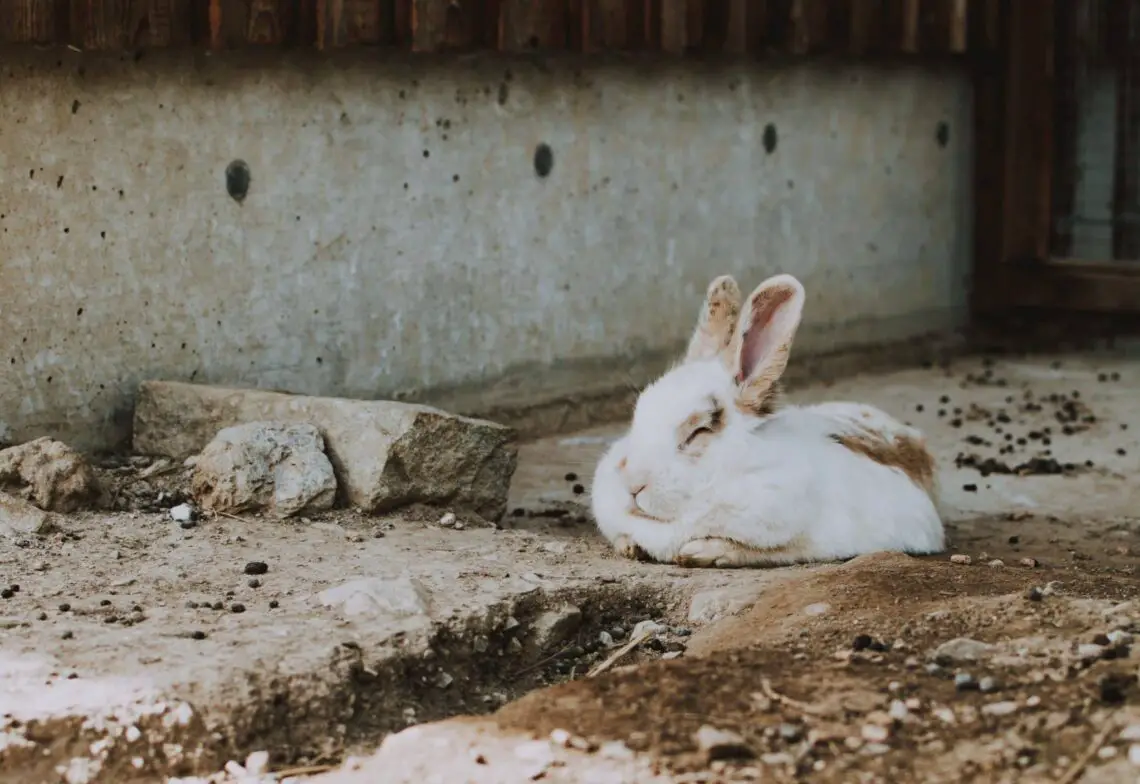

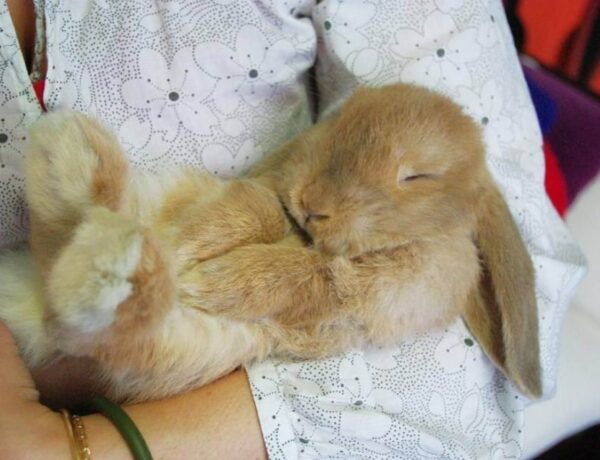
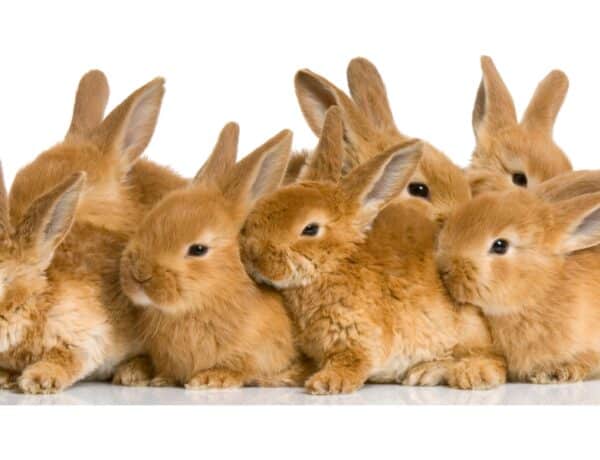
No Comments